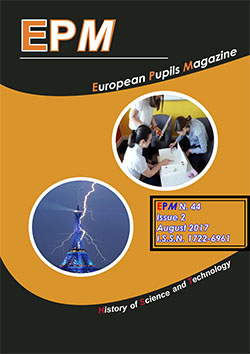Math Science Chemistry Economics Biology News Search
EPMagazine – Arguments pro Quality
Prof. Dr. Eng. Elena Helerea
Mission and Arguments pro EPM
EPMagazine, which celebrates nine-year existence, with three annual issues, has been disseminated in schools and universities, both in printed traditional format and as electronic journal. The quality of the magazine has been ever rising, once with clarifying the journal quality and with including new editorial teams from schools and universities originating in various countries.
The complex mission of EPMagazine, in close inter-connection with scientific, economic, ergonomic, ecological, moral, philosophic, instructive-educative aspects, aims at forming the youth’s multi-disciplinary competencies and at accomplishing their ethic, esthetic and moral profile.
EPMagazine is a periodical publication issued by youth for youth, which has set out to mould the critical spirit of appreciating the data and facts that have led to substantiating and developing the sciences, technique and technology.
History of sciences (natural, social) comprises dealing with the evolution of the overall reasoning and experiment-based knowledge, which describe the phenomena and processes from the natural world and human society.
Thomas Kuhn argues that science has always involved paradigms (sets of hypotheses, laws, and practices) and the passage from one paradigm to another involves sometimes the modification of the scientific theories.
The role of the history of sciences is to justify the transitions from one paradigm to another, with the rejection of the supernatural.
A history of technique and technology is directly related to presenting the evolution of the material and human resources, of the tools and energy systems used for achieving products useful to the human being, for food, shelter and protection.
Why therefore a magazine focused on the history of sciences and technology?
The major argument is that human society perceives the past, experiences the present and dreams the future into being. Leibniz would posit that “future is full of past”. Any past experience is a starting point towards the new. To put it otherwise, if you are acquainted with your past, you can decipher the future.
In this respect, EPMagazine, through submitting the evolution of sciences and technology, as modality of reflecting the human condition, marks the young authors’ effort to define the future through the examples of the past.
Inspirited with adventure spirit and passion, the young authors of the articles from EPMagazine may bring solid arguments in the young people’s choice of their scientific and technical professions; and they may contribute thereby to a better understanding of reality, with efficient irrationality-combating instruments.
For the youth from various countries of the world, EPMagazine emphasizes and enhances (on a national, European, worldwide level) the products (scientific, technical) of civilization and culture through the dissemination of adequate information (correct, multivalent, systemic), encourages the initiative, develops the creativity and mostly reinforces the feeling of local, national, European, global continuity.
Pertinent documentation
For the authors of EPMagazine, the major concern should be observing the scientific and historical truth, through eloquent documentation. However, the boom of the Internet-provided information renders difficult the retrieval of the pertinent information for a good documentation. The authors should decide which the adequate information sources are. In this respect, the first criterion for the choice of the information source should be the existence of a peer-review system for the respective magazine. The Wikipedia case is not recommended: anyone can add/fill data on this platform, therefore the data veracity can be doubted! A not updated site is likewise doubtful as documentation source.
The magazines with peer-review committee, which are evaluated and placed into hierarchies, are recommended for documentation.
For instance, the magazines from ISI web of Knowledge, which are ranked according to the impact factor (IF). The impact factor is a quality indicator for the information within periodical publications, submitted in the years 1960s by Garfield, founder of the Institute for Scientific Information (ISI), currently part of Thomson Reuters. IF is a measure of the frequency for the article citation within a year or over a certain period of time. Example: the annual impact factor of a magazine is calculated as ratio between the current year’s number of citations of the papers published in the respective magazine during the two preceding years.
This way, a magazine with high IF publishes more frequently cited articles than the ones with low IF. This magazine may be deemed of relevance for the searched information.
The quality of EPMagazine is also appreciated through taking into account the copyright. From the standpoint of the copyright owned for the original creations on the history of sciences and technology, which have been submitted in EPMagazine, these rights remain to the authors’, who accept the dissemination of their creations in this periodical publication through having filling in the Submission Form. In case the creation incorporates other authors’ materials, there it is compulsory citing the authors and/or their corresponding assent.
Hoping that the articles in the volume herein from the field of the history of sciences (biology, chemistry, physics, and so on) and technology (conversion of wind energy, extraction of oil resources, obtaining nuclear energy etc.) will open new knowledge paths, we wish you pleasant reading and we kindly invite you to step into the large and hearty home of EPM, either as readers and/or authors.


